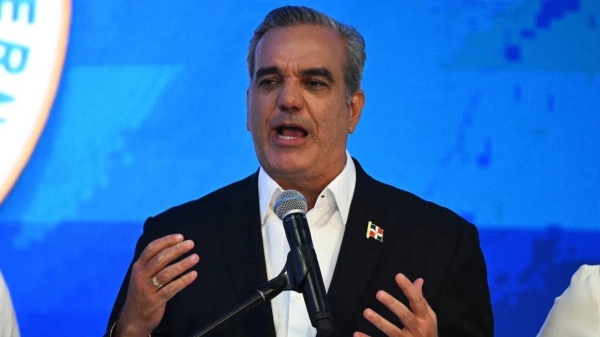Dominican Republic President Luis Abinader has declared himself the winner in the recent presidential election, with official results pending. With over 99% of polling stations counted, Abinader has a wide lead with 57.46% of the votes. His main rivals have already conceded and congratulated him on his victory, setting the stage for Abinader to assume office until 2028. The popular leader, a former economist and businessman, first took office in 2020 during the Covid-19 pandemic and has overseen economic growth in the region.
Abinader’s priorities in his first term included development, reform, and the fight against corruption. With his reelection, experts expect him to continue focusing on these areas and promise four more years of economic growth for the Dominican Republic. The election comes at a time of political and social crisis in neighboring Haiti, with Abinader’s administration taking steps to address issues on the shared island of Hispaniola. The president has been accused of stoking anti-Haitian sentiment but has also implemented measures to secure the border and airspace.
The election results have implications for the future of the Dominican Republic, as well as the relationship between the two countries sharing the island. Abinader’s victory sets the stage for continued economic growth and development under his leadership. The president’s track record in his first term gives voters confidence in his ability to address challenges facing the nation and lead the way forward. As he prepares to take on a second term, Abinader’s agenda is expected to focus on building on past achievements and addressing new challenges that may arise.
Abinader’s win also highlights the importance of addressing issues such as corruption and crime, which were among voters’ top concerns in the recent election. The president’s commitment to tackling these issues and driving economic growth has resonated with the electorate. With a mandate for another term, Abinader has the opportunity to continue implementing policies that benefit the country and its people. His leadership will be crucial in navigating the challenges ahead and ensuring a prosperous future for the Dominican Republic.
The United States embassy’s warning to Black and “darker-skinned Americans” about potential interactions with Dominican authorities underscores the importance of addressing issues of discrimination and immigration in the region. Abinader’s administration will need to navigate these sensitive issues while also maintaining relationships with neighboring countries and international partners. As the president prepares to take office for another term, he faces the task of balancing priorities at home and abroad to ensure stability and progress for the Dominican Republic. With a clear mandate from the voters, Abinader is poised to lead the country into a new era of growth and development.











